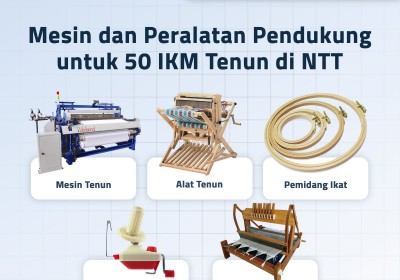Government Provides Equipment for 50 Weaving IKMs in NTT
September 21, 2021
JAKARTA – To help develop the diversity of woven textile products produced in Indonesia, the government is forging partnerships with several regional governments to facilitate the provision of machinery and equipment to help the small-to-medium scale (IKM) weaving businesses in the East Nusa Tenggara (NTT) region.
This program is led by the Industry Ministry's (Kemenperin) directorate general for small, medium and miscellaneous industries (IKMA) and the NTT regional government's industry and trade sector, as well as the NTT's regional crafts board (Dekranasda).
"We are optimistic that this given equipment will have a positive benefit for the growth of weaving IKMs in NTT so that they can become more competitive and give a larger contribution towards driving the NTT economy and the national economy as well," the acting director general of the Kemenperin's IKMA department, Reni Yanita said in a written statement on Monday (8/30).
The equipment given to the NTT IKMs include, among others, weaving sets consisting of looms thread rollers, hoop rams and various assorted tools. Up to 50 IKMs from 10 regencies in NTT accepted these tools, with each regency sending 5 artisans, ranging from the Rote Ndao, Sabu Raijua, Timor Tengah Utara, Alor, Kupang, Malaka, Lembata, Belu, Timor Tengah Selatan and Flores.
According to Reni, weaved products are one of the NTT's main economic products. Each regency sports their own unique patterns and methods and the uniqueness of the craft and the products holds significant tourism and export potential for the province.
Demand for textile products were heavily affected by the Covid-19 pandemic, with the industry contracting by 4.54% in the second quarter of 2021 due to a drop in domestic demand. However, the textiles and clothing industry remains one of Indonesia's leading industries.
The textiles and clothing industry contributed up to 6.76% of the gross domestic product (GDP) in 2020, in the non-energy sector category. Cumulatively, the industry's export value throughout 2020 reached US$10.62 billion. During the January-June 2021 period, textile exports reached US$5.86 billion.
In the midst of the pressures created by the Covid-19 pandemic, the Kemenperin has prepared various programs to help alleviate the challenges, including increasing human resource competency, developing product quality, standardization, machine and equipment facilities, as well as holding exhibitions and showcases at home and abroad.
"The Kemenperin also facilitates IKM players through the e-Smart IKM program, with the aim of increasing market access through digitalization to the global marketplace, as well as getting digital business development assistance from experts," Reni added.
Aside from this, the Kemenperin is actively encouraging the Indonesian public to use and prioritize buying products made by domestic industries, with campaigns such as the Bangga Buatan Indonesia movement. "We invite all members of the public to support their local IKMs by buying their products," he said.
These efforts are believed to have a major impact on the development of IKMs in the country, with weaving craftsmen (including tailors), raw material providers, logistics workers and workers in other related sectors benefitting greatly from these schemes.
Similar to Batik, woven cloth is also an Indonesian cultural heritage. The younger generation needs to be encouraged more to love and be proud of Indonesian woven products so that they are able to help preserve and promote it. Moreover, woven fabrics are not only used as quality fashion products, but also made into bags, wallets, home decorations, and various other products that are able to command a high selling value.
Indonesia’s Research Institutions Supporting the Development of the Electric Vehicle Industry
Indonesian Muslim Fashion and Cosmetics IKMs Shine at Dubai World Expo 2020
Govt Steps Up UMKM Transformation Efforts in the Midst of Pandemic Slowdown
Govt Encourages Promotion of IKM Products in Digital Era
Government Begins Developing Maritime Training Center in Makassar
Tweets by IDDevForum
